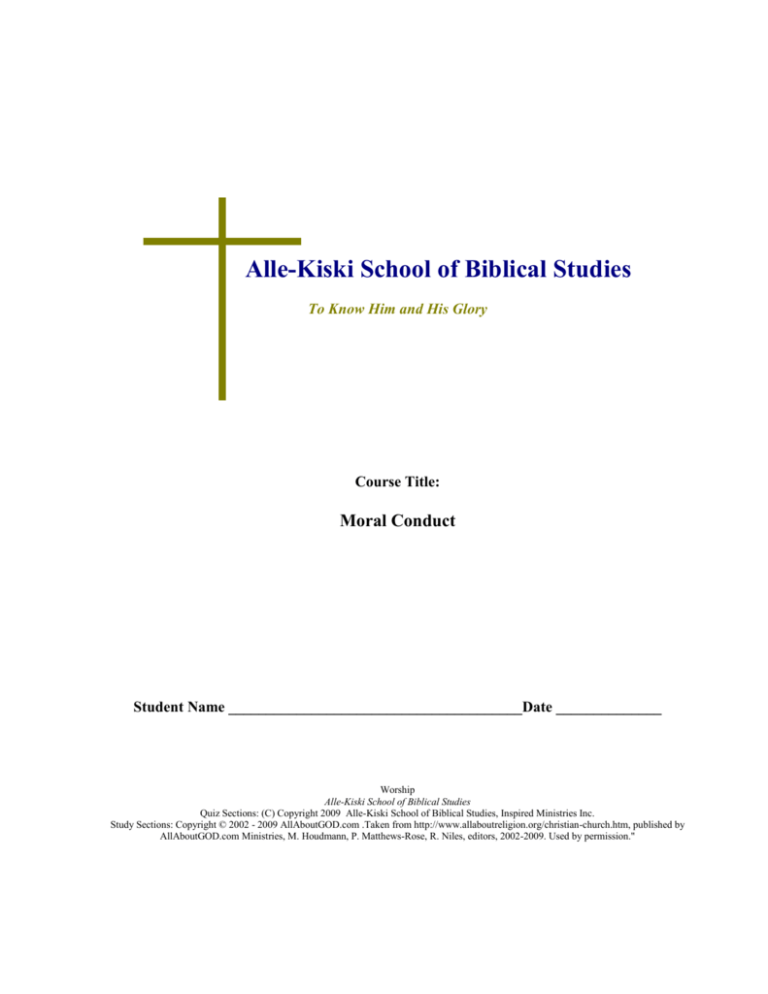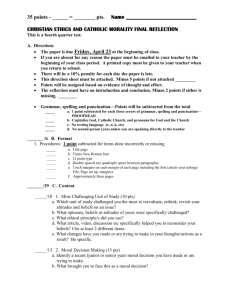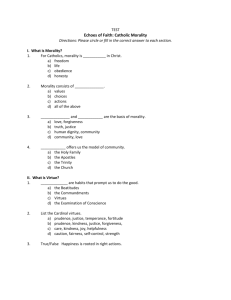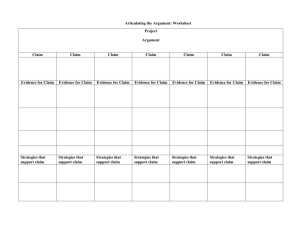Morality - Grace Community Church
advertisement

Alle-Kiski School of Biblical Studies To Know Him and His Glory Course Title: Moral Conduct Student Name _______________________________________Date ______________ Worship Alle-Kiski School of Biblical Studies Quiz Sections: (C) Copyright 2009 Alle-Kiski School of Biblical Studies, Inspired Ministries Inc. Study Sections: Copyright © 2002 - 2009 AllAboutGOD.com .Taken from http://www.allaboutreligion.org/christian-church.htm, published by AllAboutGOD.com Ministries, M. Houdmann, P. Matthews-Rose, R. Niles, editors, 2002-2009. Used by permission." 2 I: Morality Defined ----------------------------------------------------------------------- Morality speaks of a system of behavior in regards to standards of right or wrong behavior. The word carries the concepts of: (1) moral standards, with regard to behavior; (2) moral responsibility, referring to our conscience; and (3) a moral identity, or one who is capable of right or wrong action. Common synonyms include ethics, principles, virtue, and goodness. Morality has become a complicated issue in the multi-cultural world we live in today. Let's explore what morality is, how it affects our behavior, our conscience, our society, and our ultimate destiny. Quiz Section - Part: I: Morality Defined 1. What are some common synonyms of the word "morality?" _____________ ______________ __________________ ________________ II: Morality and Our Behavior ----------------------------------------------------------------------Morality describes the principles that govern our behavior. Without these principles in place, societies cannot survive for long. In today's world, morality is frequently thought of as belonging to a particular religious point of view, but by definition, we see that this is not the case. Everyone adheres to a moral doctrine of some kind. Morality as it relates to our behavior is important on three levels. Renowned thinker, scholar and author C.S. Lewis defines them as: (1) to ensure fair play and harmony between individuals; (2) to help make us good people in order to have a good society; and (3) to keep us in a good relationship with the power that created us. Based on this definition, it's clear that our beliefs are critical to our moral behavior. On Point 1, Professor Lewis says most reasonable people agree. By Point 2, however, we begin to see problems occurring. Consider the popular philosophy "I'm not hurting anyone but myself," frequently used to excuse bad personal choices. How can we be the good people we need to be if we persist in making these choices, and how will that result not affect the rest of our society? Bad personal choices do hurt others. Point 3 is where most disagreement surfaces. While the majority of the world's population believes in God, or at least in a god, the question of Creation, as a theory of origins, is definitely hotly debated in today's society. A recent report in Psychology Today concluded: "The most significant predictor of a person's moral behavior may be religious commitment. People who consider themselves very religious were least likely to report deceiving their friends, having extramarital affairs, cheating on their expenses 3 accounts, or even parking illegally." Based on this finding, what we believe about Creation has a decided effect on our moral thinking and our behavior. Without belief in a Creator, the only option that seems to be left is to adhere to moral standards we make up for ourselves. Unless we live in a dictatorial society, we are free to choose our own personal moral code. But where does that freedom come from? The view of many who do not adhere to Creation is that morality is a creation of humanity, designed to meet the need of stable societies. All kinds of life are in a process of deciding between life and death, choosing what to do with power and/or authority. This ultimately leads to a system of virtues and values. The question is: what happens when our choices conflict with each other? What if something I believe I need in order for my life to continue results in death for you? If we do not have an absolute standard of truth, chaos and conflict will result as we are all left to our own devices and desires. Quiz Section - Part: II: Morality and Our Behavior 1. Finish this sentence: Morality describes the principles that _________ _____________ ________________. 2. What will occur if we do not have an absolute standard of truth? ____________________________________________________________________________ III: Our Conscience ----------------------------------------------------------------------God has a moral law and has given every man a conscience. The conscience acts to accuse or excuse us, compelling us to remain within the bounds of God's moral standards of conduct. Nevertheless, the conscience, much like a human muscle, though it remains strong if exercised, it atrophies with disuse. At one point, while morality still exists, one no longer feels constrained by it. After continually ignoring the urging of the conscience for a period of time, the conscience no longer functions as it should. Quiz Section - Part: III: Our Conscience 1. What happens to us if we stop listening to our conscience? ____________________________________________________________________________ -----------------------------------------------------------------------------------------------------------------------To be filled out by instructor: Date of course completion ________________________________________________________ Instructor signature ______________________________________________________________ Instructor's comments:







